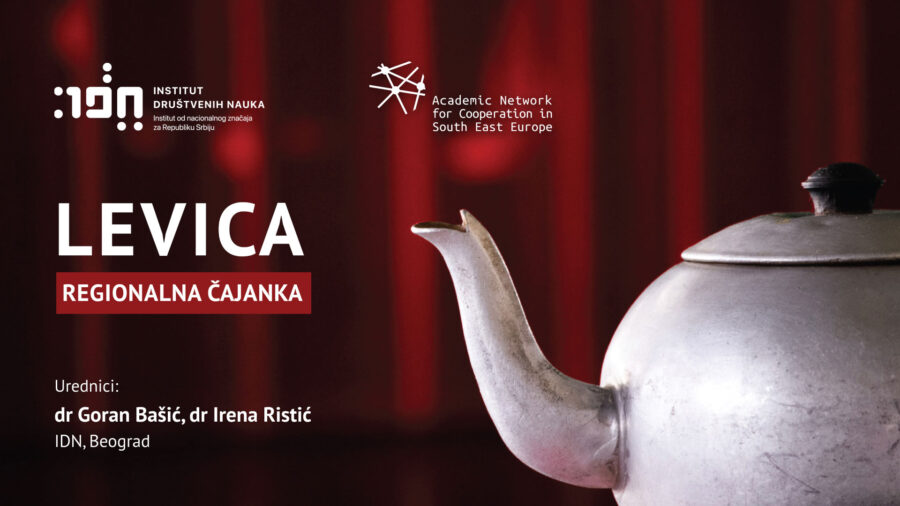Weakening and neutralisation of antagonisms is one of the major goals of the ruling capitalist system, since the only way for the Left to create an alternative to the ruling economic, political and social system once again lies exactly in this mobilisation of wider masses and creating antagonisms between social strata and groups, stressed Todor Kuljić in his lecture “Resistance to Epistemological Persecution of the Left”.
In this on-line lecture that he gave on 27 April 2023 as a part of the Regional Tea Party cycle entitled “The Left”, Kuljić put the emphasis on the two main problems concerning social sciences and the Left: epistemological persecution of the social terms and concepts of the Left and persecution of the Left’s authentic past.
Starting from Gramsci’s theory of cultural hegemony, Kuljić stressed the role of the concepts and terms that are parts of the cultural production and reproduction of power in all cultures, thus making the one who controls the socio-political terms the controller of the society itself. In Kuljić’s words, though in the post-war period an antagonism between the concepts/terms had existed to a certain extent, by the end of the 20th century a dominance of the terms that affirm the capitalist system and ideologies began, while the terms that mark different types of values have been systematically persecuted ever since. Thereby, in the last three decades, terms such as humanism, (social) solidarity, antagonism, exploitation, or self-management have been less and less present, while the terms of transition/transformation, philanthropy, social inclusion/exclusion, identity and the like, have been increasingly insisted on. Simultaneously, class struggle and justice have been replaced by national struggle and justice.
Consequences of this also include de-antagonising of the social processes dominated by the politics of identities that mutually intertwine, and thus weaken one another. This very weakening and neutralisation of antagonism, as Kuljić points out, represents one of the main goals of the ruling capitalist system, since the only way for the Left to once again create an alternative to the ruling economic, political and social system lies exactly in mobilisation of wider masses and antagonisms between social strata and groups.
The second segment of the lecture dealt with the persecution of the past of the Left. With the dissolution of the USSR, and breaking up of Yugoslavia in Southeast Europe, the primacy in editing the past was overtaken by the Right, on the wave of the so-called historic victory of liberal democracy. The Right not only began to impose its own perception of the past, but it also started to promote extremely one-sided interpretations of the history of the Left, neglecting and suppressing the universal achievements of the leftist thought and ideas.
According to Kuljić, this gradually became primarily the history of economy, leaving no room for the history of exploited workers, or for the monuments to the underprivileged and those who, inspired with the communist ideas of humanism and solidarity, had fought fascism.
Kuljić, retired full professor of sociology at the Faculty of Philosophy in Belgrade, believes that the Left should first oppose this written-down, dominant history of the indisputable victory of capitalism, and then take the lead with its theoretical efforts and show that indeed there are alternatives to capitalism. To this end, it needs to explain to the new supervisors of the past the worth of the expunged terms and concepts. Additionally, the Left needs to create counter-memory and remember what today’s Right forgets: to highlight the history of the poor, rather than of the rich, the history of the underprivileged, rather than mighty rulers, of hired workers, rather than entrepreneurs, of the exploited, rather than of the glorious nations.
Led by the conceptual history of Renhart Koselleck, according to which social periods are interpreted through concepts, rather than events, the Left must offer more plausible reconstructions and interpretations of the past than the Right. Finally, the Left should not repeat its mistakes and define itself exclusively or predominantly on the basis of anti-fascism, since anti-fascism, as Todor Kuljić vividly illustrates, “is not only Gagarin, but also Stalin”. It is therefore necessary to nurture an auto-reflexive perspective on history, considering the role of the Left in it, and to foster a self-critical politics of memory, which would also include antagonistic contents, deviations of the Left and the shadow of its past. In this way, the alive Left that possesses agency would be separated from its bygone, dead fragments that nevertheless need to be remembered, so as not to be repeated.
The lecture was given as a part of the Regional Tea Party cycle entitled “the Left”, which is organised by the Institute of Social Sciences in cooperation with the Academic Network for Cooperation in Southeast Europe.

